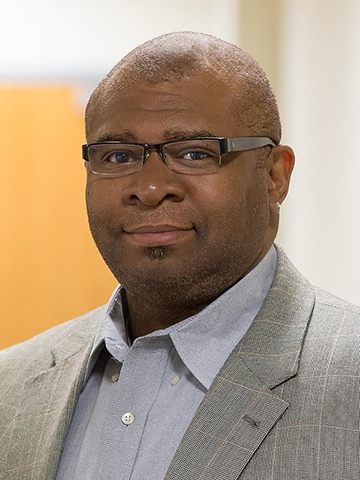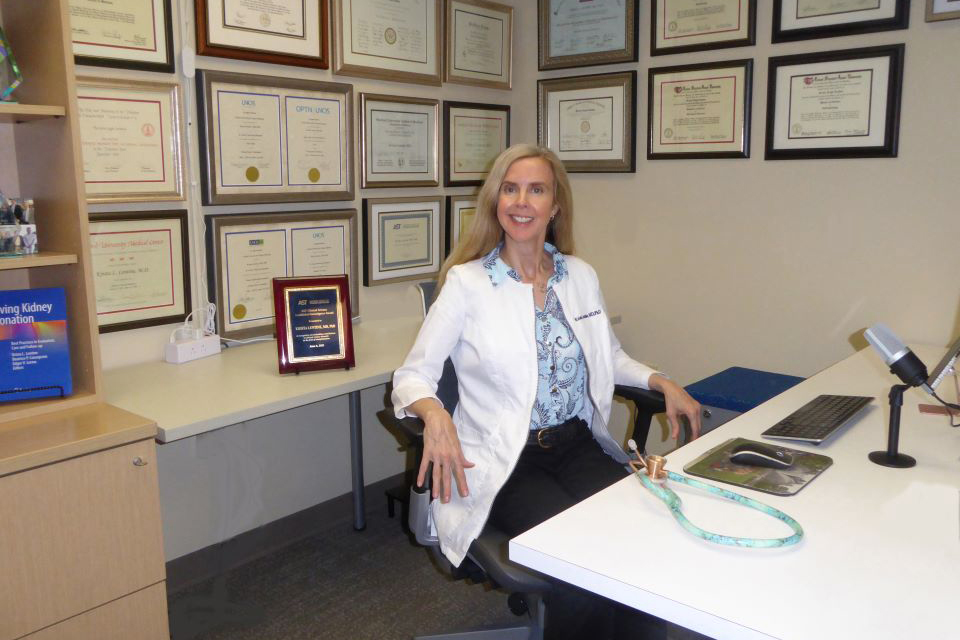SLUCare Physician Krista Lentine Honored by American Society of Transplantation
Bridjes O'Neil
Communications Specialist
bridjes.oneil@slu.edu
314-282-5007
Reserved for members of the media.
08/02/2021
The American Society of Transplantation (AST) presented SLUCare nephrologist Krista Lentine, M.D., Ph.D., with its 2021 Clinical Science Established Investigator Award at the virtual American Transplant Congress. The award is bestowed annually on a professor-level senior clinical scientist.
Lentine, professor of medicine in the Department of Internal Medicine at SLU’s School of Medicine and medical director of living kidney donation at SSM Health Saint Louis University Hospital, accepted the award.
AST is a national, multidisciplinary professional society with over 4,000 members. The annual Achievement Awards honor a small group of AST members for their contributions to transplantation and the professional society. Achievement Awards are considered a career milestone, Lentine said.
Lentine was nominated by Roslyn Mannon, M.D., Department of Internal Medicine, University of Nebraska, Vineeta Kumar, M.D., Department of Internal Medicine, University of Alabama, and the Women’s Health Community of Practice, led by Lisa Coscia, Deirdre Sawinski, M.D., and Christina Klein, M.D.
In her acceptance speech, Lentine thanked her nominators, mentors, and colleagues at SLU, Mid-America Transplant, and across the country, including Henry Randall, M.D., SLUCare Transplant Center Executive Director and Abdominal Transplant Division Chief at SSM Health Saint Louis University Hospital.

“Transplantation is inherently a team-based discipline – and is arguably unique in the depth of its foundation in collaboration,” Lentine said. “The field also maintains a unique emphasis on research and innovation.”
2021 FAST inductee
At the virtual congress, Lentine was also inducted as a 2021 Fellow of the American Society of Transplantation, alongside Randall who “nurtures a vision of collaborative excellence,” she said. In 2017, the research team co-authored a cover article in Liver Transplantation which reported the role opioid pain medications play in patient outcomes following liver transplantation.
To date, Lentine has co-authored over 300 peer-reviewed journal articles and numerous book chapters, and is lead editor of a 2021 textbook on living kidney donation. Recent work includes co-authorship of a National Kidney Foundation (NKF) Position Statement, “A Roadmap for Innovation to Advance Transplant Access and Outcomes,” published July 27 in The American Journal of Kidney Diseases. Lentine served as workgroup chair and lead author.
Other recognitions include her receipt of the NKF's 2021 Excellence in Transplantation Award and the Missouri NKF Chapter’s 2020 Award of Excellence. These awards recognize her contributions in transplant advocacy, research, and policy, including testimony supporting the passage of the Missouri Living Donor Protection Act in 2020. In 2018, Lentine received the NKF’s Shaul Massry Distinguished lecture award. She also serves on the American Society of Nephrology (ASN) Policy and Advocacy Committee.
Lentine is the Mid-America Transplant/Jane A. Beckman endowed chair and co-director of clinical research in the Abdominal Transplant Center, where the research team focuses on transplant epidemiology, outcomes and economics.
Mentorship and teamwork are crucial to success in academic and clinical practice, Lentine said. She is grateful for transformative exposure to the profound impact of transplantation and organ donation on patients’ lives during her early career from her mentors, Mark Schnitzler, Ph.D. and Daniel Brennan, M.D. Their synergistic mentoring inspired her to combine clinical insights with “big data” science in efforts to optimize the use and outcomes of donated organs as a public trust, fostering partnerships that have continued to this day, she said.
Lentine pays it forward by mentoring the next generation of clinical scientists, including Yasar Caliskan, M.D., a recent SLU fellow who has joined SLU’s nephrology and transplant faculty. Lentine said Caliskan brings unique expertise in transplantation, genetics, and glomerular disease research. Caliskan joins SLU transplant nephrology experts Bahar Bastani, M.D., and Fadee Abu Al Rub, M.D., and the division’s team including four specialized surgeons.
“The rapid pace of evolving clinical needs in our field challenges me to pursue new ways to advance clinical and cost-effective care for the patients we serve,” she said. “Building synergistic collaborations locally and nationally –while mentoring new cohorts of clinical scientists– are vital to providing the gift of life to more patients in need.”
About SLUCare Physician Group
SLUCare Physician Group is the academic medical practice of Saint Louis University, with more than 500 health care providers and 1,200 staff members in hospitals and medical offices throughout the St. Louis region. SLUCare physicians are among the most highly trained in their fields - more than 50 specialties in all - and are national and international experts, renowned for research and innovations in medicine.
About Saint Louis University School of Medicine
Established in 1836, Saint Louis University School of Medicine has the distinction of awarding the first medical degree west of the Mississippi River. The school educates physicians and biomedical scientists, conducts medical research, and provides health care on a local, national and international level. Research at the school seeks new cures and treatments in five key areas: cancer, liver disease, heart/lung disease, aging and brain disease, and infectious diseases.


















